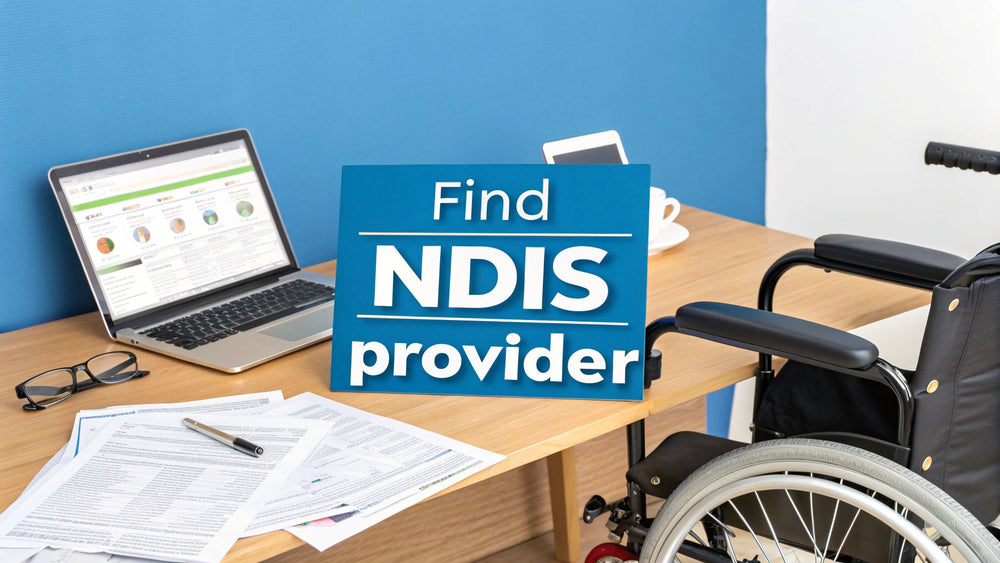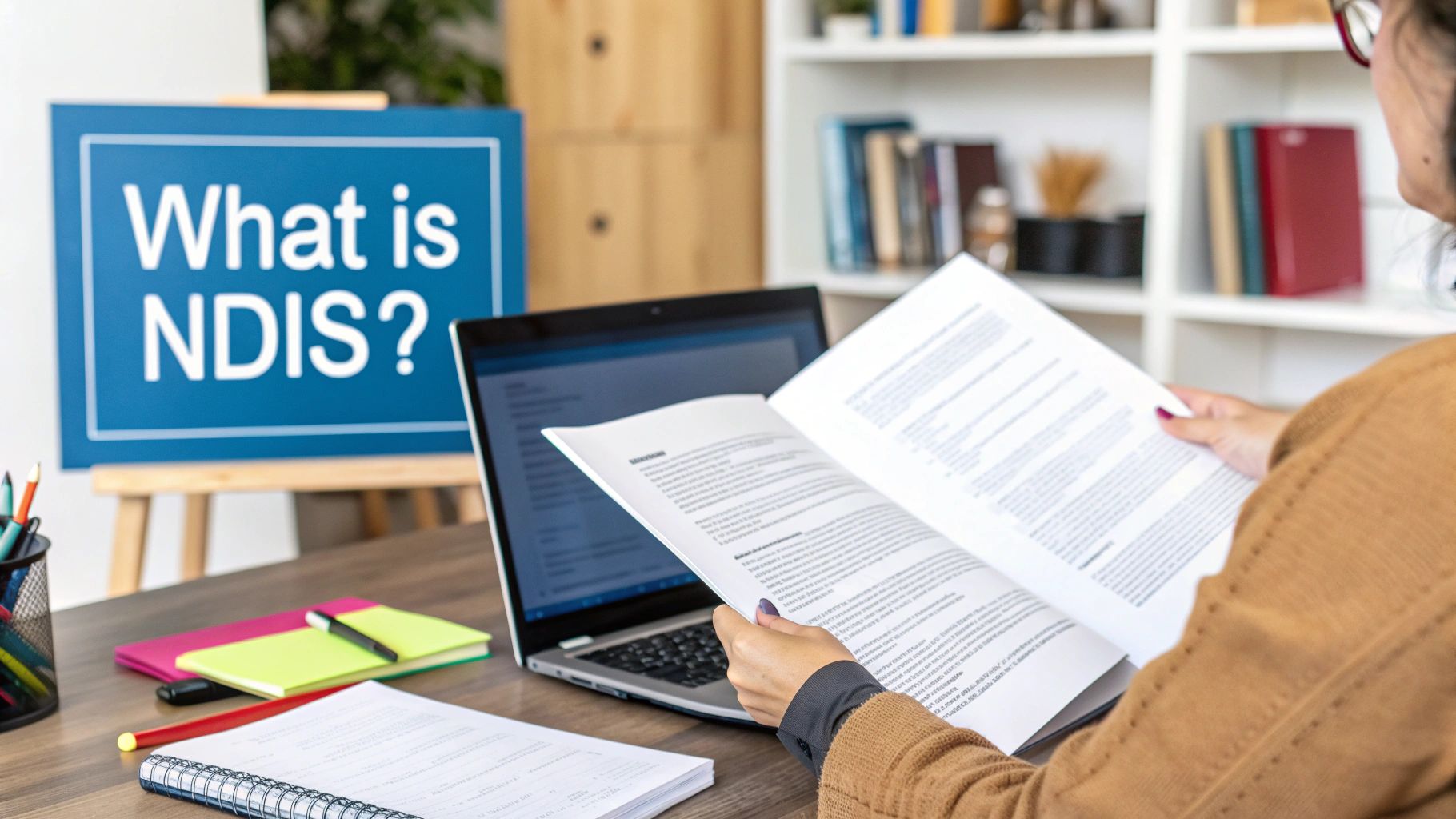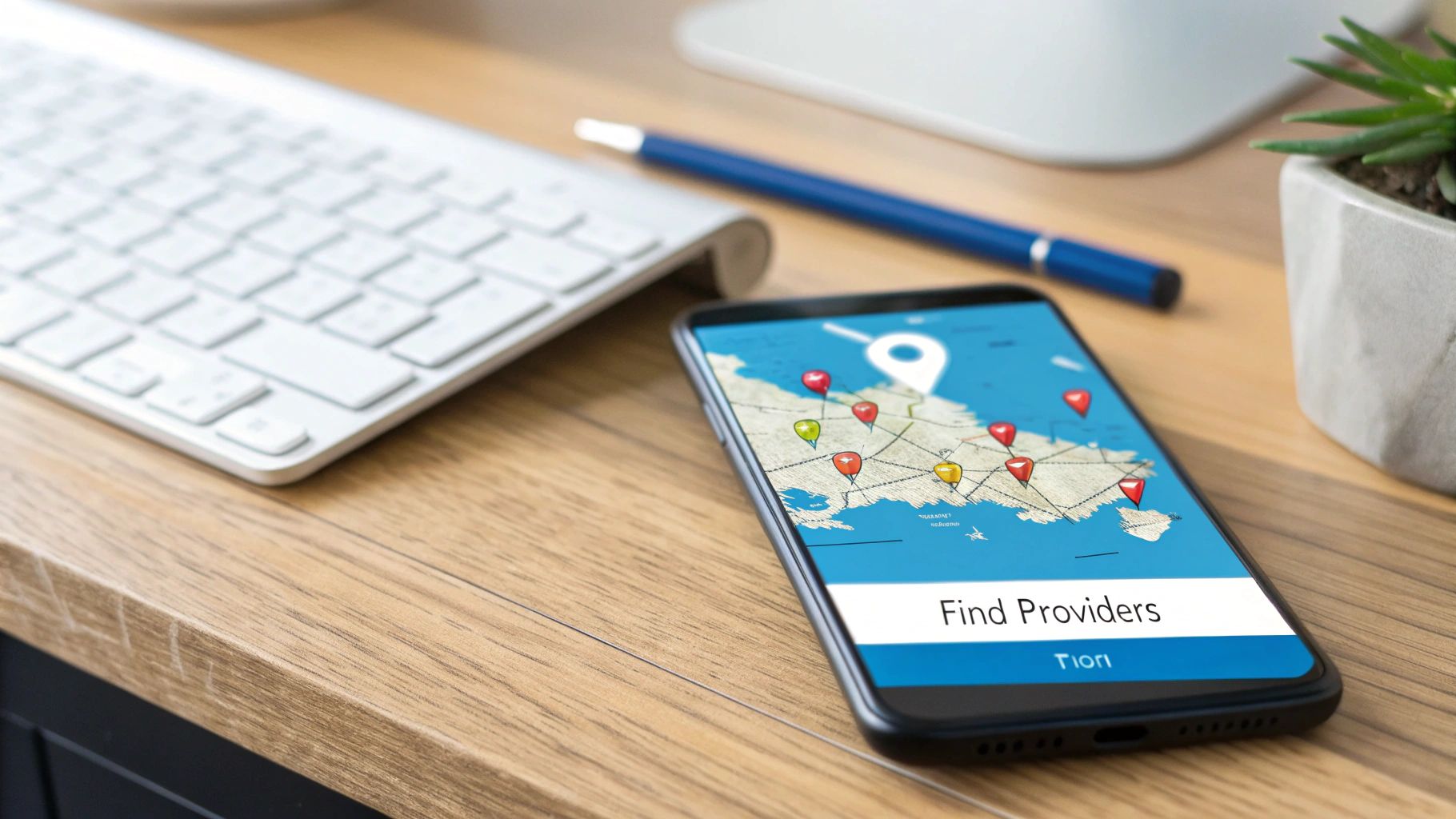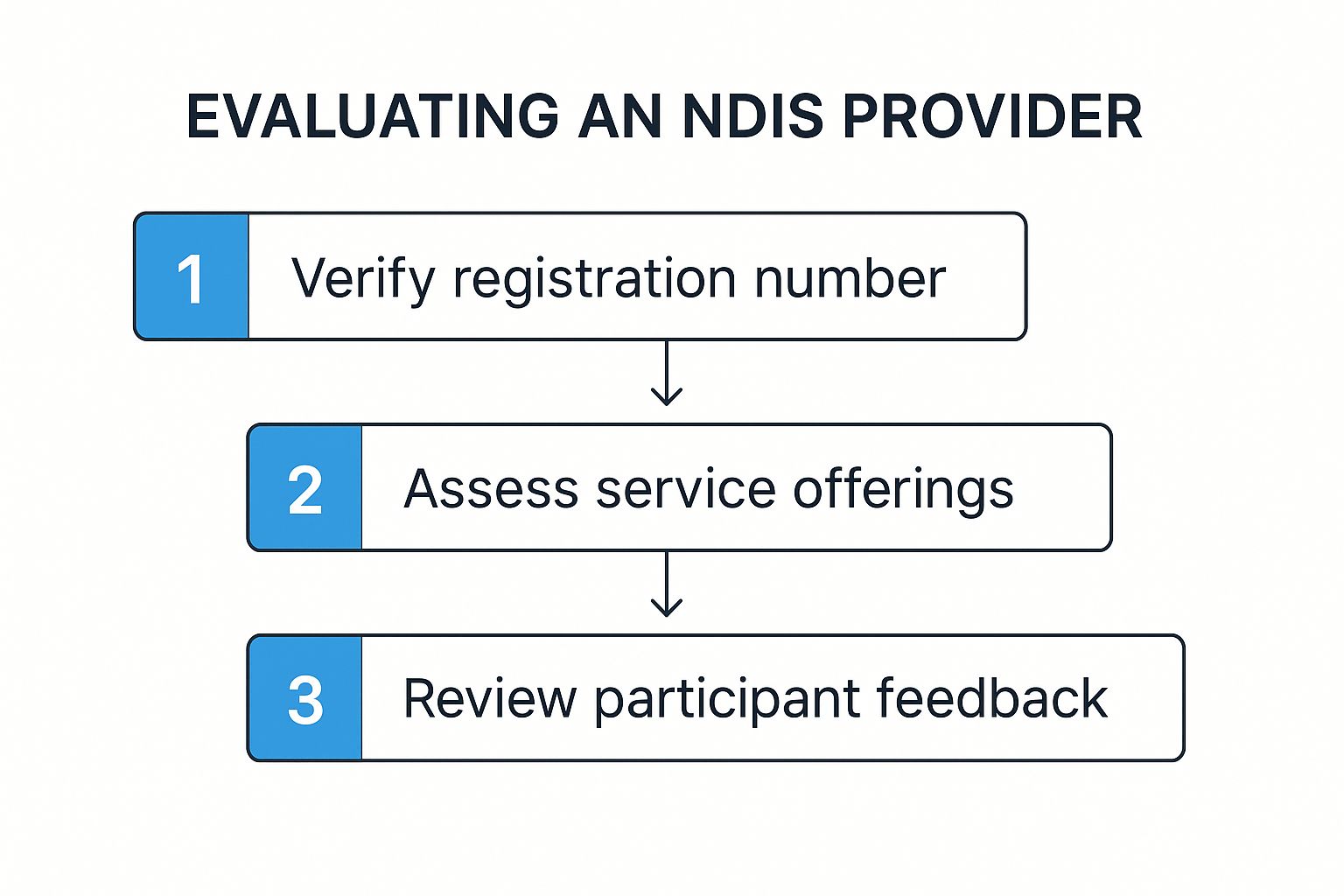Find NDIS Provider Easily | Expert Support & Guidance

Alright, let's get you started on the path to finding the perfect NDIS provider. The first, and arguably most important, part of this journey is simply figuring out who's out there. It’s all about creating a solid longlist of potential providers you can then investigate more closely.
Think of it as casting a wide net. You don’t need to know everything about them just yet; the goal is to gather a healthy number of options so you have a strong pool to choose from later on.
Your First Steps to Finding an NDIS Provider
So, where do you actually begin? While it might feel like a huge task, breaking it down into a few key sources makes it far more manageable. Don't just stick to one place—using a few different avenues will give you a much more complete picture of who can support you in your local area.
Where to Look for Providers
Your best bet is to combine official tools with some good old-fashioned community knowledge. This approach ensures you're not just getting the "brochure" version of a provider but also hearing about real experiences.
Here’s where I always suggest people start:
- The Official NDIS Provider Finder: This is your go-to starting point. It’s a powerful tool on the MyPlace portal that lets you filter providers by postcode, the specific supports you need (like therapy or help around the house), or even by name if you’ve already heard of one.
- Your Local Area Coordinator (LAC): Don't underestimate the value of your LAC or Early Childhood partner. These folks are on the ground in your community and often have a great sense of which providers are well-regarded and who might be a good fit, based on feedback from other participants.
- Community and Social Media Groups: Online forums and Facebook groups for NDIS participants can be a goldmine of candid advice and personal recommendations. Hearing directly from someone who has used a service is incredibly valuable. For those in South Australia, a good place to start understanding the local scene is by exploring a guide to navigating NDIS in Adelaide.
The NDIS Provider Finder tool is the primary engine for this search. It's designed to cut through the noise and show you exactly who operates in your suburb and offers the supports listed in your plan.

Remember, you're not alone in this. The NDIS is a massive, nationwide scheme. As of March 2025, more than 717,000 Australians were active NDIS participants, which really highlights the incredible scale and reach of the support available. This means there's a huge community and a wealth of shared experience out there to draw from.
Getting to Grips with NDIS Provider and Plan Management Types

Before you even start looking for an NDIS provider, there’s a crucial piece of the puzzle you need to understand: how your NDIS plan is managed. This one detail dictates who you can hire, how you pay them, and frankly, how much admin work lands on your plate.
It’s the foundation of your entire NDIS experience.
There are three main ways to handle your NDIS funds, and each one comes with its own set of rules about providers.
The Three Plan Management Options
Think of these options as a sliding scale between hands-on control and hands-off convenience. Let’s break down what each one really means for you day-to-day.
- Agency-Managed: With this option, the National Disability Insurance Agency (NDIA) handles all the payments directly. It’s simple, but there's a catch—you can only use NDIS-registered providers.
- Plan-Managed: Here, you bring in a plan manager who acts as your financial go-between. They pay your invoices for you, which frees you up to use both registered and non-registered providers. It's a fantastic middle ground, offering choice without the headache of managing the money yourself.
- Self-Managed: You’re in the driver's seat. The funds go directly to you, and you manage all the payments. This gives you maximum flexibility to hire anyone you choose, but it also means you're responsible for all the bookkeeping and financial records.
Many people find that choosing plan management or self-management opens up a world of possibilities. That extra flexibility is often the main reason participants move away from the Agency-managed model—it gives them far more control over who supports them.
So, How Does This Affect Your Provider Search?
Knowing your management type is the first step because it immediately narrows down your search. Not every provider can work with every management style, and the difference is huge.
The numbers really tell the story. As of March 2025, an incredible 191,467 providers were working with plan-managed participants. In contrast, only 9,415 providers were available to those who were Agency-managed. You can dig deeper into these figures on the NDIS provider market data page.
What this means in practice is that a massive number of providers—from your local gardener to a highly specialised therapist who's a sole trader—operate without being formally registered with the NDIS.
If your plan is Agency-managed, your search starts and ends with the official NDIS Provider Finder portal. But if you’re plan-managed or self-managed, your options explode. You can look almost anywhere, tapping into a rich network of community services and independent professionals.
How to Vet and Shortlist Your Top Providers
Now that you have a list of potential providers, it's time to dig a little deeper. The goal here is to sift through the options and find the handful of providers who genuinely feel like the right fit for you. This is less about just gathering names and more about making an informed choice.
Start With Some Online Sleuthing
Your first stop should be their website. Think of it as their digital front door. Look past the glossy photos and marketing buzzwords. What are you really looking for?
You want to see substance. Do they clearly outline their values? Is there information about their team's qualifications or how they vet their staff? A transparent and easy-to-navigate website often reflects a well-run, client-focused organisation. If you have to hunt for basic information, that can be a red flag.
Pick Up the Phone for a Chat
Once you’ve done your online homework, it's time to have a real conversation. A quick phone call can tell you volumes about a provider's culture and how they operate. This isn't just about ticking boxes; it's about getting a feel for the people you might be working with.
The real test here is their attitude. Do they listen patiently and seem happy to answer your questions, or do you feel like you're being rushed off the phone? That first impression often speaks volumes about the kind of relationship you can expect.
Key Questions for Your First Call
Before you dial, jot down a few essential questions. This isn't an interrogation; it’s simply a way to see if their approach aligns with your needs from the get-go.
- Who will my support worker be? Ask them how they work to ensure you have a consistent support worker. Building a trusting relationship is key, and high staff turnover can make that difficult.
- How do you handle communication? Find out their process for keeping you, the support worker, and the office in the loop. Is it via an app, email, or regular phone calls?
- What happens if something goes wrong? It's crucial to know how they handle feedback or resolve complaints. A good provider will have a clear, straightforward process.
- What are your policies? Ask about practical things like their cancellation policy or how much notice you need to give to change a service.

This whole process—from checking them out online to reviewing feedback—gives you a solid foundation for making your choice. If you're based in South Australia and want an even more detailed breakdown, our guide on choosing the right disability support in Adelaide offers some great local insights.
Your Final Check: NDIS Registration
Before you make any final decisions, there's one last, crucial step. Always verify their registration with the NDIS Quality and Safeguards Commission. Their online Provider Register is a free tool that lets you check a provider’s current status and see if any compliance issues have been flagged. It’s a simple check that provides essential peace of mind.
To help you stay organised during this stage, we've put together a simple checklist. You can use it to compare providers side-by-side as you speak with them.
| Evaluation Area | What to Look For | My Notes (Provider A vs B) |
|---|---|---|
| First Impression | Friendly, patient, and knowledgeable staff. Did they listen to you? | |
| Communication | Clear process for updates, feedback, and emergencies. | |
| Staffing Model | Commitment to consistent support workers. Clear staff screening process. | |
| Flexibility | Policies on cancellations and changing services. | |
| Expertise | Do they have specific experience with your needs or goals? | |
| NDIS Registration | Verified and in good standing on the NDIS Commission register. |
Using a structured approach like this helps you move beyond a "gut feeling" and make a decision based on clear, comparable information. It ensures the provider you choose is not only qualified but is also the best possible partner for your NDIS journey.
Finalizing Your Choice and Starting Services

Alright, you've done the hard yards with your research and have a shortlist of potential providers. Now comes the moment of truth: making the final decision and getting your supports up and running. This is a big step, but with the right approach, you can feel confident you're making a great choice.
The next logical step is to set up a 'meet and greet'. This isn't just about meeting a manager or a sales rep; it's your opportunity to connect with the actual support workers who could be part of your daily life.
You're looking for that click. A genuine connection. Do their personalities and communication styles feel right for you? This personal rapport is incredibly important—it's the foundation of a successful and trusting support relationship.
Locking in the Details: The Service Agreement
Once you’ve found a team you feel truly comfortable with, it’s time to look at the service agreement. Don’t just skim this document. Think of it as the instruction manual for how your supports will work. It’s crucial to make sure every detail lines up with your NDIS plan and the conversations you've had.
Here are a few things I always tell people to check carefully in the fine print:
- Costs and Charges: Are all the fees laid out clearly? Make sure they are consistent with the official NDIS Pricing Arrangements.
- Cancellation Terms: Life happens. What's their policy if you need to cancel a scheduled service? Check for fair and reasonable notice periods.
- The Support Schedule: Does the agreement list the exact days, times, and types of support that you discussed and need?
A solid service agreement is your best friend. It protects everyone involved by making sure there are no grey areas. It sets clear expectations from the get-go and helps avoid any mix-ups down the track.
The NDIS provider landscape is massive—it’s projected to become a $48.7 billion industry by 2025. That’s a lot of providers to choose from, which really highlights why finding a reliable, trustworthy partner in this huge ecosystem is so vital. You can discover more insights about the NDIS market to understand its scale.
Being upfront about your goals from the very beginning is the key to building a strong partnership. If you find these final steps a bit daunting, remember that a support coordinator can be an invaluable guide. You can learn more about the essential role of support coordination and how they help turn your plan into reality.
Sidestepping Common Traps When Choosing a Provider
Choosing an NDIS provider is a big decision, and honestly, it's easy to fall into a few common traps. I've seen it happen time and again. Learning from others' experiences is the smartest way to sidestep these issues and find a provider who genuinely has your back.
The "Convenience" Trap and Rushed Decisions
One of the biggest mistakes I see people make is choosing a provider simply because they're the closest one. Location is a nice perk, don't get me wrong, but it should never be the deciding factor over quality or expertise. A provider ten minutes down the road won't do you any good if their support workers aren't a good fit or don't have experience with your specific needs.
Another classic slip-up? Rushing the whole process. When you feel the pressure to get supports in place right now, it’s tempting to sign up with the first provider who seems okay. Take a breath. It’s far better to invest a little more time upfront to get it right, rather than having to untangle a bad fit later.
Rushing often leads to the most critical mistake: not properly reading the service agreement. This is your contract. Skimming over the fine print can lead to nasty surprises like hidden fees, inflexible cancellation policies, or a massive gap between what was promised and what's delivered.
Looking Past the Polished Website
It's so easy to be impressed by a slick website and a fancy brochure. But you have to dig deeper. A major red flag is when you can't find genuine reviews or testimonials from actual participants. You need to hear directly from the people who have walked this path before you.
Here are a few other pitfalls I always tell people to watch for:
- Ignoring staff consistency. If you don't ask how they handle rostering, you could end up with a revolving door of support workers. Continuity of care is vital.
- Fuzzy communication. A provider who can't give you a straight answer on how they'll communicate with you is setting you up for frustration down the track.
- Forgetting your plan management type. This is a big one. Not every provider works with self-managed, plan-managed, and NDIA-managed funds. You need to know how your plan is managed and choose a provider who can accommodate it. For a deeper dive, it's worth understanding the difference between NDIS self-managed vs plan-managed.
At the end of the day, steering clear of these common mistakes means you're being proactive. It allows you to find an NDIS provider based on what truly matters: quality, compatibility, and trust.
Your Questions About Finding NDIS Providers Answered
Once you’ve shortlisted a few NDIS providers, you’re bound to have some lingering questions. That's a good thing. Asking the right questions now helps you feel confident and truly in charge of your support journey.
Let's walk through some of the most common things people ask at this final stage.
What if I'm Unhappy with My Provider?
First things first: you are never locked in. If a provider isn't the right fit, you absolutely have the right to change. It happens, and it's a normal part of the process.
The first step is to check your service agreement. Look for the section on ending the agreement – it will outline the notice period you need to give, which is usually between 14 and 28 days.
You'll need to give your current provider written notice. While that's happening, you can get the ball rolling with your new provider to make sure there's no interruption to your supports. A bit of planning here ensures everything transitions smoothly.
Can I Use a Non-Registered Provider?
This is a fantastic question, and the answer comes down to one thing: how your NDIS plan is managed.
- Agency-Managed: If the NDIA pays your providers directly, then you must use NDIS-registered providers.
- Plan-Managed or Self-Managed: You've got more flexibility. You can choose to use both registered and non-registered providers. This can open up a much wider world of support, from a local gardener you trust to a specialised therapist who isn't NDIS-registered.
For many people, this flexibility is a huge advantage of plan or self-management. It gives you greater control to find niche services that are the perfect match for your goals.
How Do I Know if a Provider's Prices Are Fair?
The NDIS has your back on this one. To protect participants and ensure value for money, they publish the NDIS Pricing Arrangements and Price Limits. This document sets the maximum price a provider can charge for specific supports.
Before you sign anything, just double-check that their quotes are in line with these official limits. A good, transparent provider won't hesitate to show you how their rates stack up against the NDIS guidelines.
Checking this helps you get fair value and makes your funding stretch further. For some local context, looking into resources about disability services in Adelaide can also give you a better feel for your options.
At Vana Care, we believe in transparent, person-centred support that puts you in the driver's seat. If you're looking for a provider in South Australia who values genuine connection and flexible care, we're here to help. Discover the Vana Care difference at https://www.vanacare.com.au.


